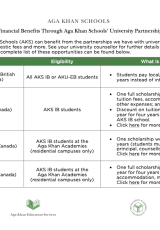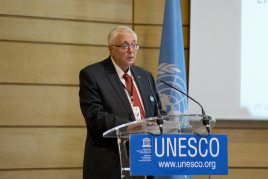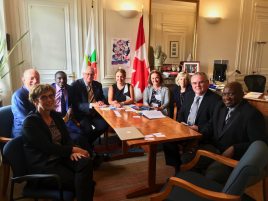Guest Article: Anne Wade
According to UNESCO, there are nearly 800 million people around the globe who cannot read, write, or count; there are 250 million children who cannot decipher a single sentence, even though many have spent years in school. In the least developed countries, one quarter of young men aged 15 to 24 and one third of young women of the same age are illiterate. Core competencies such as reading and writing are the essential building blocks for personal achievement and the success of a society.
The mission of the Centre for the Study of Learning and Performance (CSLP), hosted by Concordia University in Montreal, Canada is to advance scholarship on teaching and learning processes, and to develop new pedagogical tools based on this new knowledge.
The CSLP team has developed the Learning ToolKit (LTK+), a suite of five bilingual (English and French), evidence-based and evidence-proven tools designed to support the development of literacy, numeracy, inquiry and other competencies within an environment that encourages self-regulated learning and student ownership. Funded by dozens of research and development grants, the tools within the LTK+, along with their support materials, have been developed, refined, implemented and researched over many years. Projects have unfolded across Canada, and in various regions of the United States, Australia, China, England, Hong Kong, and Portugal. The LTK+ has been made available to the educational community at no charge.
Our Kenya Project
Funded by Concordia University and our lead partner, Aga Khan Academies, our project began in 2012 with a small pilot study. The initial research focus was on learning about the impact of our evidence-based tools on the literacy achievement of students in early grades (1 -3) and on the design of a professional development programme to improve the teaching of literacy in Kenyan schools.
CSLP was honoured with the UNESCO King Sejong Literacy Prize in September 2017. With funding from Global Affairs Canada and Aga Khan Foundation Canada, and subsequently, Canada’s International Development Research Centre and Social Science and Humanities Research Council, the project has grown dramatically. Much of this success has been due to the Academies' extensive local network of key stakeholders, their professional development expertise given their ubiquitous outreach activities and their exceptional widespread reputation. For example, given their extensive expertise in technology integration and competency-based programmes, our LTK+ Project Coordinators have been invited to sit on a number of working groups for the Kenyan ministry of Education and often serve as facilitators for national teacher training initiatives as new programmes are rolled out. Such involvement has contributed to raising the national awareness and understanding of the pedagogical underpinnings of the other LTK+ tools. As a result, this past year use of the LTK+ has expanded to include implementation of all of the other tools.
Additionally, due to the efforts of our local team of LTK+ coordinators and ambassadors, who were instrumental in training and supporting hundreds of teachers and thousands of children, along with the support of our partners, use of the LTK+ is now unfolding in such regions as Mombasa, Nairobi, Kwale, Kirindon, Meru and Laikipia.
Evidence reveals that teachers developed a certain level of comfort with using our literacy tools as part of their English language teaching. Teachers also improved their literacy instruction as they began to use a more balanced approach in the teaching of key literacy subs-skills.
Our Partners
Our partnerships have grown substantially over the years with active collaboration from organisations who share an interest on the uses of technology to improve the teaching and learning of essential educational competencies.
These partnerships include an international collection of scholars (Chinese University of Hong Kong, Shanzu Teachers Training College, Université du Québec à Montréal, University of British Columbia, University of Nairobi, Wilfrid Laurier University), graduate students, and educational practitioners and policy-makers, the latter including government agencies (Ministry of Education and its agencies, such as the Kenya Institute of Curriculum Development), NGOs (African Storyboard, I Choose Life, World Vision Canada, World Vision Kenya), social enterprises (Camara Education), and a number of Aga Khan Development Network agencies including Aga Khan Foundation Canada, Aga Khan Foundation East Africa, Aga Khan Foundation Mali, and perhaps most significantly, the Aga Khan Academies.
The success of our work has been grounded in a strong relationship with the Aga Khan Academy in Mombasa in particular. It has acted as an anchor site for our activities and has provided a strong hub, from which we have been able to base our local operations. Our work has also benefited greatly from the Academies’ in house expertise and its very solid and longstanding relationship with all the Kenyan government’s education related offices and institutes.
Our Vision
As we build on our research of the impact of our literacy tools, we are also exploring the impact of the other tools on numeracy and information literacy competency development and how they can be used for formative assessment and the development of lifelong learners. Ultimately we hope to improve teaching and learning outcomes through the use educational technology by exploring the scalability and sustainability challenges of using the LTK+ and supporting pedagogy in the developing world contexts of Kenya and elsewhere in sub-Saharan Africa and will contribute to more widely generalisable theory and research about the uses of technology for teaching and learning.
By Anne Wade
For more information on the Learning Toolkit, visit: www.concordia.ca/ltk
For more information on the Kenya project, visit: http://www.concordia.ca/research/learning-performance/tools/learning-toolkit.html#international
publications







